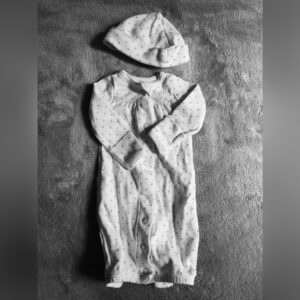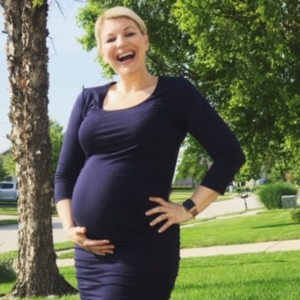As I sat on the cold exam table in the proverbial paper gown, I bit my lip and held in my tears. The doctor could tell there was a quiver in my voice, and he knew he had just unloaded a ton of bricks on me. He’s a gentle giant of a guy with a bald head and beard, but there was no delicate way for him to tell a 37-year-old woman she was perimenopausal.
“I thought I was too young for this,” I said sort of hoping he might tell me it was all a mix-up, and he meant that news for the woman in the room next to me. No such luck. He said approximately 1% of women in the U.S. enter perimenopause under the age of 40.
Wonderful.
Thirty-seven. Who wants to hear that diagnosis at 37? A part of me died that day.
I left the doctor’s office and drove to work in silence. I didn’t talk to God or turn on upbeat music to try and drown out my sadness. It was like I was on autopilot. I just drove.
RELATED: It’s OK to Admit You’re Not OK, Mama
I called my husband when I got to the parking lot of my office, and through tears, I told him what the doctor said. He tried to comfort me and tell me how amazing I was as a wife and how much he loved me. He makes me feel good about myself, but that day I was feeling less than.
Less than a woman.
I suffered for more years than I can count with lady problems as I often refer to them. Problems that were out of the normal realm of cramps, headaches, and bloating. I’d been through countless rounds of hormones to try and stabilize things, but it never worked, and now I was going on more. Hooray for the inevitable weight gain that came with every round of hormones.
I had been told at a young age that I might struggle to get pregnant.
It was true.
My husband and I tried unsuccessfully for the first few years of our marriage. My heart ached for a baby of our own, but it seemed it wasn’t in the Lord’s plan.
In addition to my lady problems, there were several other issues in the first few years of marriage that had any thoughts of having children of our own put on the back burner, but at least the idea, the choice, was always there.
Not so much anymore.
Oh, sure, there is still a chance I can get pregnant, and my God does perform miracles, but the odds are not in my favor. They say around 2% of perimenopausal women actually conceive. I already had issues getting pregnant, so that statistic doesn’t bode well for me.
RELATED: Infertility – I’m in the 1%
But, honestly, it’s not just about getting pregnant. I was at peace with not having any biological children.
Yes, the enemy can often creep in my brain and remind me that my body couldn’t conceive, but I serve a God who reminds me I’m not defective—children just weren’t part of His plan for me.
I struggled with feeling less than. Feeling like at 37, a part of my womanhood is being slowly taken away from me. I felt like I had just finally accepted the fact that my husband and I weren’t meant to have children, and now this.
But when these feelings of less than rear their ugly head, and they do, Romans 8:39 reminds me I am so very, very loved by my Creator. In my weakest moments, when I feel totally inadequate, I can remind myself I am loved.
RELATED: God Uses Broken People to Do Beautiful Things
This didn’t catch God off guard, He knew this was the plan for my life, and now I need to do something with it. I need to use this part of my story to show others that we’re not less than and that we are fearfully and wonderfully made (Psalm 139:14).
Even in all my brokenness, He thought the world needed me.
Now that is something I can hold tight to and know I am not less than—I am exactly who He made me to be.
So, if you’re struggling with thoughts of inadequacy, remember you were created in His image, and He desperately loves you. God desires to have a relationship with each and every one of us, and He wants us to know that we are enough.
You, my friend, are enough.

If you liked this, you'll love our book, SO GOD MADE A MOTHER available now!
Order NowCheck out our new Keepsake Companion Journal that pairs with our So God Made a Mother book!
Order Now


























